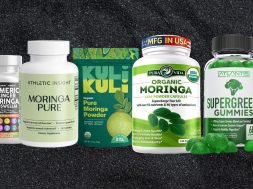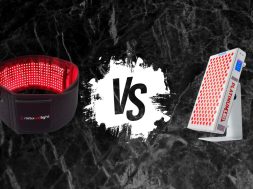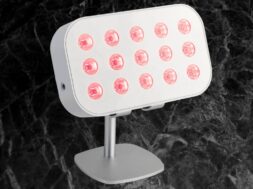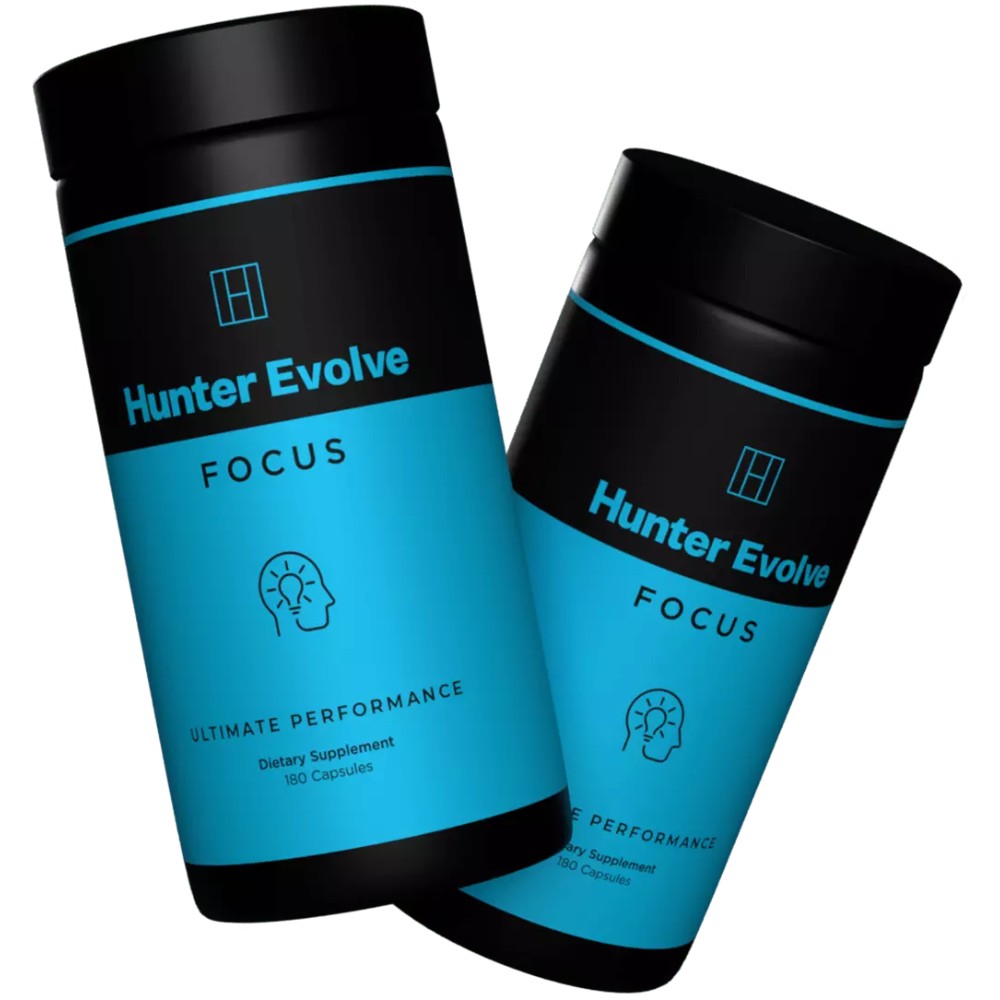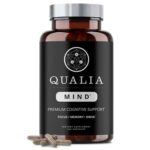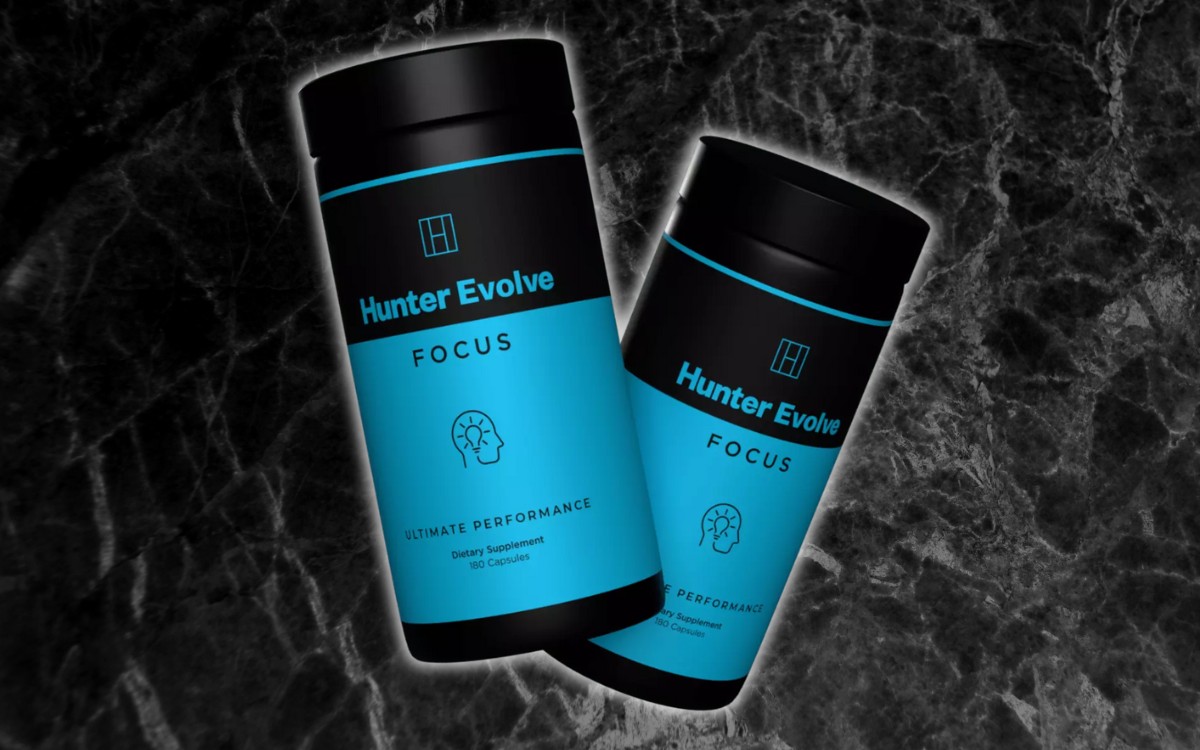
Hunter Focus is a nootropic supplement that has garnered attention for its claims of enhancing cognitive functions such as focus, memory, and mental clarity.
Manufactured by Roar Ambition, it positions itself as a premium option within the crowded brain health supplements market. So, I got my hands on it and tested it before mentally demanding tasks (like writing this review).
Does it deserve the premium label?
Pros
- Enhanced Cognitive Function: Improves cognitive functions such as memory, attention, and focus, thanks to ingredients like nootropics and adaptogens.
- Mood Improvement: Ingredients like L-Theanine and Rhodiola Rosea can help reduce stress and improve mood, making it easier to handle anxiety and depression.
- Increased Energy Levels Without Crashes: Caffeine boosts energy levels, helping to overcome fatigue without the jitters associated with high caffeine intake.
Cons
- Price: High-quality nootropic supplements like Hunter Focus are expensive which might not fit everyone’s budget.
- Stimulant-Based: While having a stimulant is typically a pro, it can be a negative where you can’t take it in the evening; otherwise, you may disturb your sleep.+
Quick Verdict
Hunter Focus is an effective neurostimulant designed to boost brain function. It has the most effective nootropic stack of caffeine and L-theanine among other effective brain boosting ingredients.
However, our #1 nootropic of choice is Mind Lab Pro. It’s formulated with an effective stack of nootropic ingredients without any stimulants so you can take it any time of day to improve cognitive function in the short and long term.
Who Is Hunter Evolve?
Hunter Evolve is part of the Roar Ambition family and is a premium supplement brand catered to the upper echelon of the fitness, business, and health markets.
The brand is distinguished by its focus on creating high-quality, research-backed products aimed at individuals seeking to improve their physical health, cognitive performance, and overall lifestyle without compromise.
Hunter Evolve’s product line is centered around three core supplements: Hunter Test, a testosterone booster; Hunter Burn, a fat burner; and Hunter Focus, a nootropic.
The brand prides itself on transparency, offering comprehensive ingredient lists and dosages to ensure consumers are well-informed about what they take.
Manufactured in facilities that comply with FDA and cGMP standards, Hunter Evolve ensures the highest purity and safety of its products.
The brand’s commitment to quality matches its investment in research and development, ensuring that its formulations are effective and current with the latest scientific findings.
Hunter Focus
Hunter Focus Nootropic Supplement
Boost energy and cognitive function without jitters or crashes.
CHECK CURRENT DEALSHunter Focus Ingredients

Acetyl L-Carnitine 800 mg
Though more studies are needed, L-carnitine has not been shown to have any cognitive benefits when taken as a supplement in healthy individuals [1].
It demonstrates potential in those dealing with cognitive deterioration, although results are mixed.
According to the consensus, it helps keep brain cells alive by bolstering cellular energy production, preventing damage from pollutants, and stimulating growth factors that are essential for cell survival [2].
It is worth mentioning that acetyl L-carnitine may be a potential early detection and therapy option for Alzheimer’s disease, as it is found in lower amounts in patients with memory problems and the disease.
Animal studies have shown that ALC has neuroprotective and cognitive benefits, which means it may be able to improve brain function and reverse the effects of aging [34].
Human trials have shown conflicting results, with some indicating improvements in cognitive impairments across populations and others suggesting changes in brain chemistry and function in Alzheimer’s patients [35].
Additional benefits include potential reductions in depressive symptoms and aid with weight loss [36][37].
L-Tyrosine 500 mg
L-tyrosine improves cognitive flexibility and facilitates seamless task transition [3].
This quality is especially useful in high-pressure situations or when handling multiple tasks simultaneously, which is all too common in daily life and at work. [4].
According to studies, taking at least 2 grams of L-tyrosine daily can significantly increase general mental performance.
The amount in Hunter Focus is 500 mg, which is below the effective level required to provide brain-boosting benefits.
Lion’s Mane Mushroom 500 mg
The prospect of Lions Mane Mushrooms improving brain function is intriguing. According to research, 600 mg helps to reduce stress and improve cognitive performance, particularly in young adults [5].
Further benefits in working memory, complicated attention, and reaction time have been reported following the ingestion of 1 g [6].
These mushrooms appear to have promise in terms of mental agility and mood, even though most of the data has yet to be examined.
Unfortunately, Hunter Focus contains only half of the 1 g dose used in the research.
Bacopa Monnieri 300 mg
Experimental data suggests that Bacopa Monnieri, an Ayurvedic herb associated with aging, may improve cognitive function and memory [7]. According to research, Bacopa may help with verbal learning, memory development, and delayed recall [8].
It also improves cognitive functions, including attention and processing speed [9]. However, the evidence for its impact on cognitive function in healthy young persons is inconclusive [10].
The recommended daily doses vary from 300 to 450 mg. While generally well tolerated, it can cause stomach troubles in certain people.
More research is required to fully understand its impact on various cognitive capacities and the optimal dosages.
Hunter Focus contains 300 mg of Bacopa Monnieri, which falls within the recommended dosage range. It’s why I’ve ranked Hunter Focus as the best nootropic for memory and learning.
Ashwagandha Root 300 mg
As a time-honored herbal remedy, Ashwagandha treats a wide range of health conditions. Animal studies have shown that it can increase the quantity of blood cells, potentially enhancing aerobic capacity [11].
Moreover, it can potentially reduce lipid peroxidation and oxidative stress, which could be beneficial in treating tardive dyskinesia [12].
Ashwagandha has also exhibited Nootropic properties, which may have potential therapeutic benefits in the context of Alzheimer’s disease [13]. The daily dosage recommendations for the extract are 6–10 grams of ground roots [14] or 100–1250 mg [15].
While generally considered safe, it is advisable to exercise caution when taking this medication, especially in cases of hyperthyroidism or pregnancy. Sedation may be induced, and digestive issues may potentially develop with excessive concentrations.
The optimal 300 mg of Ashwagandha in Hunter Focus is sufficient to promote cognitive advantages.
Citicoline 250 mg
Citicoline is frequently the focus of discussions concerning memory enhancement. According to research, 500 mg per day may increase episodic memory or the ability to recall personal experiences and specific events, especially in older people [16].
Other research suggests that ingesting at least 500 mg of this drug daily may provide cognitive benefits to healthy adults [17].
The Hunter Review formulation contains 250 mg of citicoline, which may not achieve the full potential seen in research advocating a double dose.
L-Theanine 200 mg
L-Theanine has been recognized for its beneficial effects on mental health. Studies have demonstrated its capacity to reduce stress and anxiety with a daily dose of 200-400 mg [18][19].
This chemical is notable for its ability to produce relaxation without causing sleepiness, establishing L-Theanine as a critical component for mental support, particularly under stress.
Another advantage is that it lessens the jitters and anxiety typical for increased caffeine use. Caffeine and l-theanine have a synergistic effect, making them a prime nootropic combo.
Ginko Biloba 120 mg
Extracts of Ginkgo biloba are utilized to enhance cognitive performance. They contain antioxidants, which possess anti-inflammatory properties and improve blood circulation.
Ginkgo biloba extract has been observed to alleviate chronic brain problems in animal experiments by modifying the cholinergic system and inflammatory mediators [20].
Clinical trials have proved that it enhances working memory and processing efficiency [21]. However, its effectiveness in adults under 60 who are in good health is unknown [22].
Daily dosing typically varies between 120 and 300 mg. While infrequent, potential adverse effects may consist of migraines and stomach irritation, the latter of which may induce hematuria in patients prescribed specific medications.
The dose in Hunter Focus is on the lower limit but should be enough to provide the abovementioned benefits.
Caffeine Anhydrous 100 mg

Everyone has encountered the beneficial impacts of caffeine. A morning coffee or energy drink aids in maintaining mental acuity, productivity, and sharpness.
A potent form of caffeine, caffeine anhydrous is extracted from the foliage and seeds of coffee plants. The anhydrous label indicates the powder state in which caffeine is frequently found as an ingredient in products that enhance energy and nootropics.
Incorporating the caffeine L-theanine combination into this product enhances cognitive and physical performance.
Enhanced working memory, reaction time, visual processing speed, increased alertness, and decreased mental and physical fatigue are some benefits [23] [24].
Phosphatidylserine 75 mg
Phosphatidylserine at 100-300 mg daily improves memory function in elderly individuals experiencing cognitive decline [25].
Scientific studies support its efficacy, which also includes assisting individuals affected by neurodegenerative disorders [26]. However, the 75 mg of phosphatidylserine in Hunter Focus may not be enough to see these benefits.
Maritime Pine Bark Extract 75 mg
Referred to as Pycnogenol, Pine Bark Extract is a powerful antioxidant that may improve cognitive functions.
Initial studies point to positive results for the elderly, students, and professionals, implying effects on mind and memory [27]. It may also help with traumatic brain injuries [28].
Mind Lab Pro includes this substance to achieve similar outcomes, refining mental sharpness for inquiring minds looking for a natural advantage.
Rhodiola Rosea 50 mg
Rhodiola Rosea is a plant used in herbal medicine for its adaptogenic characteristics, which assist the body in managing stress. It contains active chemicals such as salidroside and rosavin, which protect brain cells.
Rhodiola Rosea has been shown in studies to boost mood and lessen symptoms of anxiety, stress, and sadness [29].
It may also provide some cognitive benefits, but the evidence is limited. The suggested daily dosage is 100-170 mg, with a rosavin content of 3.6-6.14 mg [30].
Panax Ginseng 40 mg
Red or white ginseng is produced from Panax ginseng. It has mildly hypotensive and vasorelaxant effects on nitric oxide production in the organism [31]. Antioxidant enzyme activity is increased, and oxidative damage associated with aging in rodents may be mitigated [32].
Ginseng has been associated with memory benefits, specifically in age-related cognitive decline; it can also boost mental and physical resilience, alleviate fatigue, and assist the body in adjusting to stress [33].
The daily standard dosage consists of 0.5 to 2 g of dry root or 200 mg of extract. Nevertheless, excessive dosages may induce overstimulation and elevate blood pressure, rendering it contraindicated for individuals afflicted with acute asthma or hypertension.
With 40 mg of ginseng in this product, there is no risk of overstimulation, but it’s also unlikely to get positive effects.
Spanish Sage 25mg
Spanish Sage, or Salvia, has been studied in various trials for its potential to enhance memory and cognition.
These studies, often using a placebo-controlled, double-blind, and crossover design, have shown promising results. For instance, dosages of 50 mg of Salvia essential oil significantly improved immediate word recall in healthy young adults [38].
The effects were dose-dependent, with certain dosages enhancing memory performance at specific time points after administration.
Additionally, Spanish Sage has been found to modulate mood positively, increasing feelings of alertness, calmness, and contentedness [39].
In trials with young and older adults, Salvia demonstrated an ability to improve various cognitive functions, including secondary memory and attention, and reduced mental fatigue [40].
While these findings offer preliminary support for Salvia’s cognitive and mood-enhancing effects, they are tempered by limitations such as small sample sizes and variable treatment doses.
Further research is encouraged to explore Salvia’s efficacy more thoroughly, especially over longer-term use and in treating conditions like Alzheimer’s disease.
Hunter Focus Price

Hunter Focus is in the higher price range for nootropic supplements. It’s half the price of the most expensive Qualia Mind but slightly more expensive per serving than similar formulations.
| Hunter Focus | Price | Price per Serving |
|---|---|---|
| 1 Bottle (30 servings) | $90 | $3 per serving |
| 2 Bottles (60 servings) | $180 | $3 per serving |
| 4 Bottles (120 servings) | $270 | $2.25 per serving |
Hunter Focus Benefits
Enhanced Cognitive Function
Cognitive function is a broad term that is sure to grab the attention of nearly everyone.
Unwavering focus is the most critical factor in today’s world of distraction, and nootropics always aim to improve this “superpower” through their formulas.
Other ingredients improve mood and energy levels, which, combined with enhanced focus, can help you get more things done than you thought possible.
It’s why I’ve ranked Hunter Focus as the best nootropic for energy and focus.
Memory, creativity, and learning are also essential for many occupations. Creativity is equally important for creative jobs and for those that require complex problem-solving, often with tight time constraints.
Some ingredients, like L-theanine and L-tyrosine, are added to boost concentration, others, like Lion’s Mane and Maritime Pine Bark, work for memory, and caffeine takes care of energy levels.
This combination enhances cognitive function, at least for those who absorb the supplement well and feel its effects.
No Energy Crashes
Hunter Focus contains 100 mg of caffeine, which is similar to a cup of coffee. But it combines with L-theanine for the ultimate nootropic stack that takes the edge off caffeine, resulting in smooth energy without jitters and energy crashes.
Who Is Hunter Focus For?
Busy Professionals
These days, almost all jobs are demanding in one way or another, especially regarding mental capabilities. This is why the nootropics market has become so huge.
When a nootropic works, it can make your professional life infinitely easier, regardless of your area- be it business, academics, responding to emergencies, or many other challenging occupations.
Coffee Haters
Caffeine is a super drug, and the most popular way of taking it is through coffee. But many people can’t drink coffee either because they hate the taste or because their stomachs organize a revolt after a single cup.
For those people, taking it as a supplement is the answer, and Hunter Focus contains a nice dose of 100 mg of caffeine.
Students
Study sessions are hard to start or do for extended periods. Hunter Focus helps keep you locked in and focused to retain the information you’re learning. Further, you can take it before exams for a mental edge.
My Experience With Hunter Focus

All nootropics with caffeine in their formulation work, and Hunter Focus is no different. I took Hunter Focus before writing this review and before a podcast, giving me smooth energy. I have no jitters or caffeine anxiety, even though I can be sensitive to caffeine.
The combination with L-theanine takes the edge off the caffeine. I feel “dialed in” while writing this review and haven’t been distracted by simple things like my phone.
There’s also no energy crash afterward like I’d get with an energy drink. One downside is I can’t take this in the afternoon as caffeine too close to bed ruins my sleep.
User Reviews & Testimonials
Hunter Focus is a new product with few reviews, but all are positive, and people seem to enjoy the effects. Here are some examples:
“I’m always a bit wary when trying a new nootropic. Hunter Focus also hasn’t been around that long, so again, that made way for skepticism. But I was actually pleasantly surprised by Hunter Focus. The nootropic is packed with huge effective doses, which gives it its brain-boosting power.
I’ve been taking the supplement for at least 4 months now and have experienced some great improvements in terms of my focus levels, attention and mood. I used to struggle to remain calm in stressful situations, and my anxiety would be through the roof. With Hunter Focus, I’m able to maintain a positive outlook. I can’t recommend it enough.”- Jacob Gregg.
“As a father to 3 kids and with an office job that I seem to run away with sometimes, it can be hard to switch off from work. Honestly… I needed something natural and effective to help me switch my focus. I tried a bit of meditation but then found Hunter Focus to help me relax and prioritize. My mental energy is so much better and I no longer let stressful situations get to me..
And I’ve also given Hunter Test a go and find it works great stacked with Hunter Focus to keep me in the best shape – physically and mentally. Will keep taking.
Pros: Potent formula, no harmful ingredients, works well with other Hunter supplements
Cons: Tad expensive” – John S.
Hunter Focus Side Effects
Hunter Focus aims for safety and efficacy with researched ingredients. These ingredients have no reported negative side effects, except caffeine if you’re sensitive to it.
I found no adverse effects taking Hunter Focus and felt great. However, there’s always a possibility of side effects. Consult with a healthcare professional, particularly if you have underlying health conditions or are taking other medications.
Hunter Focus Alternatives
NooCube
Some other ingredients’ usefulness, like huperzine-A and alpha GPC, are still disputed.
NooCube seeks to promote alertness and cognitive performance, is free of stimulants, and specifies the dosage of each ingredient.
This nootropic can benefit a wide range of people, including combat athletes, busy professionals, academics, older people, and gamers. It provides various cognitive benefits without the jitters or other negative effects of caffeine.
You can read my full breakdown in my NooCube review.
Vyvamind
Vyvamind’s formulation revolves around the caffeine and L-theanine combo but also includes many other ingredients for different mental benefits, although their dosages do not always meet the recommendations.
Vyvamind is great for coffee-averse people, busy professionals who need a focus boost, and students during study sessions.
You can read my full breakdown in my Vyvamind review.
Mind Lab Pro
Personally, I’ve used Mind Lab Pro for intellectually taxing jobs, like writing reviews, and have seen its usefulness.
It’s appropriate for a broad spectrum of users, including working professionals, students, and older folks, and provides benefits such as improved focus, memory retention, and cognitive processing speed.
Our Mind Lab Pro review contains a comprehensive breakdown.
Qualia Mind
The product offers options with or without caffeine, catering to those sensitive to stimulants or those who wish to take it in the evening.
Despite its high price point of $159 per bottle, making it one of the most expensive nootropics on the market, and the requirement to take seven capsules daily, Qualia Mind has received positive feedback for its effectiveness.
Neurohacker Collective, the company behind Qualia Mind, aims to optimize well-being by applying complex systems science. It focuses on supplements that support cognitive function, mental health, and physical wellness.
Their approach integrates scientific research with holistic health principles, aiming to address the root causes of health issues.
Qualia Mind has various ingredients, including Acetyl L-carnitine, Artichoke Leaf Extract, and Bacopa Monnieri, to support cognitive enhancement and long-term brain health.
You can read my full breakdown in my Qualia Mind review.
Frequently Asked Hunter Focus Questions
Is Hunter Focus Good?
Hunter Focus is a good nootropic supplement based on being a stimulant with other cognitive-enhancing ingredients.
How Much Caffeine Is In Hunter Focus?
Hunter Focus has 100 mg of caffeine, which is slightly more than a regular cup of coffee.
Summary
Hunter Focus is an excellent neurostimulator, providing smooth energy to enhance focus and cognitive function. Its best price is when bought in bulk, drastically reducing the cost per serving.
Hunter Focus
Hunter Focus Nootropic Supplement
Boost energy and cognitive function without jitters or crashes.
CHECK CURRENT DEALSReferences
- Chen N, Yang M, Zhou M, Xiao J, Guo J, He L. L-carnitine for cognitive enhancement in people without cognitive impairment. Cochrane Database Syst Rev. 2017 Mar 26;3(3):CD009374. doi: 10.1002/14651858.CD009374.pub3. PMID: 28349514; PMCID: PMC6464592.
- Pennisi, M., Lanza, G., Cantone, M., D’Amico, E., Fisicaro, F., Puglisi, V., … & Malaguarnera, G. (2020). Acetyl-L-carnitine in dementia and other cognitive disorders: a critical update. Nutrients, 12(5), 1389.
- Steenbergen, L., Sellaro, R., Hommel, B., & Colzato, L. S. (2015). Tyrosine promotes cognitive flexibility: evidence from proactive vs. reactive control during task switching performance. Neuropsychologia, 69, 50-55.
- Jongkees, B. J., Hommel, B., Kühn, S., & Colzato, L. S. (2015). Effect of tyrosine supplementation on clinical and healthy populations under stress or cognitive demands—A review. Journal of psychiatric research, 70, 50-57.
- Docherty, S., Doughty, F. L., & Smith, E. F. (2023). The Acute and Chronic Effects of Lion’s Mane Mushroom Supplementation on Cognitive Function, Stress and Mood in Young Adults: A Double-Blind, Parallel Groups, Pilot Study. Nutrients, 15(22), 4842.
- La Monica, M. B., Raub, B., Ziegenfuss, E. J., Hartshorn, S., Grdic, J., Gustat, A., … & Ziegenfuss, T. N. (2023). Acute Effects of Naturally Occurring Guayusa Tea and Nordic Lion’s Mane Extracts on Cognitive Performance. Nutrients, 15(24), 5018.
- Calabrese, C., Gregory, W. L., Leo, M., Kraemer, D., Bone, K., & Oken, B. (2008). Effects of a standardized Bacopa monnieri extract on cognitive performance, anxiety, and depression in the elderly: a randomized, double-blind, placebo-controlled trial. The journal of alternative and complementary medicine, 14(6), 707-713.
- Morgan, A., & Stevens, J. (2010). Does Bacopa monnieri improve memory performance in older persons? Results of a randomized, placebo-controlled, double-blind trial. The journal of alternative and complementary medicine, 16(7), 753-759.
- Kongkeaw, C., Dilokthornsakul, P., Thanarangsarit, P., Limpeanchob, N., & Scholfield, C. N. (2014). Meta-analysis of randomized controlled trials on cognitive effects of Bacopa monnieri extract. Journal of ethnopharmacology, 151(1), 528-535.
- Pase, M. P., Kean, J., Sarris, J., Neale, C., Scholey, A. B., & Stough, C. (2012). The cognitive-enhancing effects of Bacopa monnieri: a systematic review of randomized, controlled human clinical trials. The Journal of Alternative and Complementary Medicine, 18(7), 647-652.
- Ziauddin, M., Phansalkar, N., Patki, P., Diwanay, S., & Patwardhan, B. (1996). Studies on the immunomodulatory effects of Ashwagandha. Journal of ethnopharmacology, 50(2), 69-76.
- Naidu, P. S., Singh, A., & Kulkarni, S. K. (2006). Effect of Withania somnifera root extract on reserpine?induced orofacial dyskinesia and cognitive dysfunction. Phytotherapy Research: An International Journal Devoted to Pharmacological and Toxicological Evaluation of Natural Product Derivatives, 20(2), 140-146.
- Bhattacharya, S. K., Kumar, A., & Ghosal, S. (1995). Effects of glycowithanolides from Withania somnifera on an animal model of Alzheimer’s disease and perturbed central cholinergic markers of cognition in rats. Phytotherapy research, 9(2), 110-113.
- Raut, A. A., Rege, N. N., Tadvi, F. M., Solanki, P. V., Kene, K. R., Shirolkar, S. G., … & Vaidya, A. B. (2012). Exploratory study to evaluate tolerability, safety, and activity of Ashwagandha (Withania somnifera) in healthy volunteers. Journal of Ayurveda and integrative medicine, 3(3), 111.
- Bonilla, D. A., Moreno, Y., Gho, C., Petro, J. L., Odriozola-Martínez, A., & Kreider, R. B. (2021). Effects of Ashwagandha (Withania somnifera) on physical performance: Systematic review and bayesian meta-analysis. Journal of functional morphology and kinesiology, 6(1), 20.
- Nakazaki, E., Mah, E., Sanoshy, K., Citrolo, D., & Watanabe, F. (2021). Citicoline and memory function in healthy older adults: a randomized, double-blind, placebo-controlled clinical trial. The Journal of Nutrition, 151(8), 2153-2160.
- Jasielski, P., Pi?del, F., Piwek, M., Rocka, A., Petit, V., & Rejdak, K. (2020). Application of citicoline in neurological disorders: a systematic review. Nutrients, 12(10), 3113.
- Hidese, S., Ogawa, S., Ota, M., Ishida, I., Yasukawa, Z., Ozeki, M., & Kunugi, H. (2019). Effects of L-theanine administration on stress-related symptoms and cognitive functions in healthy adults: a randomized controlled trial. Nutrients, 11(10), 2362.
- Williams, J. L., Everett, J. M., D’Cunha, N. M., Sergi, D., Georgousopoulou, E. N., Keegan, R. J., … & Naumovski, N. (2020). The effects of green tea amino acid L-theanine consumption on the ability to manage stress and anxiety levels: A systematic review. Plant foods for human nutrition, 75, 12-23.
- Kim, M. S., Bang, J. H., Lee, J., Han, J. S., Baik, T. G., & Jeon, W. K. (2016). Ginkgo biloba L. extract protects against chronic cerebral hypoperfusion by modulating neuroinflammation and the cholinergic system. Phytomedicine, 23(12), 1356-1364.
- Stough, C., Clarke, J., Lloyd, J., & Nathan, P. J. (2001). Neuropsychological changes after 30-day Ginkgo biloba administration in healthy participants. International Journal of Neuropsychopharmacology, 4(2), 131-134.
- Canter, P. H., & Ernst, E. (2007). Ginkgo biloba is not a smart drug: an updated systematic review of randomised clinical trials testing the nootropic effects of G. biloba extracts in healthy people. Human Psychopharmacology: Clinical and Experimental, 22(5), 265-278.
- Souza, D. B., Del Coso, J., Casonatto, J., & Polito, M. D. (2017). Acute effects of caffeine-containing energy drinks on physical performance: a systematic review and meta-analysis. European journal of nutrition, 56(1), 13-27.
- Waldron, M., Patterson, S. D., Tallent, J., & Jeffries, O. (2018). The effects of an oral taurine dose and supplementation period on endurance exercise performance in humans: a meta-analysis. Sports Medicine, 48, 1247-1253.
- Kang, E. Y., Cui, F., Kim, H. K., Nawaz, H., Kang, S., Kim, H., … & Go, G. W. (2022). Effect of phosphatidylserine on cognitive function in the elderly: A systematic review and meta-analysis. 54(1), 52-58.
- Ma, X., Li, X., Wang, W., Zhang, M., Yang, B., & Miao, Z. (2022). Phosphatidylserine, inflammation, and central nervous system diseases. Frontiers in Aging Neuroscience, 14, 975176.
- Schoenlau, F. (2021). The multifactorial contributions of Pycnogenol® for cognitive function improvement. In Nutraceuticals in Brain Health and Beyond (pp. 335-341). Academic Press.
- Norouzy, A., & Malekahmadi, M. (2023). French maritime pine bark extract and neurological disorders. In Treatments, Nutraceuticals, Supplements, and Herbal Medicine in Neurological Disorders (pp. 181-192). Academic Press.
- Cropley, M., Banks, A. P., & Boyle, J. (2015). The effects of Rhodiola rosea L. extract on anxiety, stress, cognition and other mood symptoms. Phytotherapy research, 29(12), 1934-1939.
- Malík, M., & Tlustoš, P. (2022). Nootropics as cognitive enhancers: types, dosage and side effects of smart drugs. Nutrients, 14(16), 3367.
- Yu, J., Eto, M., Akishita, M., Kaneko, A., Ouchi, Y., & Okabe, T. (2007). Signaling pathway of nitric oxide production induced by ginsenoside Rb1 in human aortic endothelial cells: a possible involvement of androgen receptor. Biochemical and biophysical research communications, 353(3), 764-769.
- Fu, Y., & Ji, L. L. (2003). Chronic ginseng consumption attenuates age-associated oxidative stress in rats. The Journal of nutrition, 133(11), 3603-3609.
- Nocerino, E., Amato, M., & Izzo, A. A. (2000). The aphrodisiac and adaptogenic properties of ginseng. Fitoterapia, 71, S1-S5.
- Kobayashi, S., Iwamoto, M., Kon, K., Waki, H., Ando, S., & Tanaka, Y. (2010). Acetyl?l?carnitine improves aged brain function. Geriatrics & gerontology international, 10, S99-S106.
- Montgomery, S. A., Thal, L. J., & Amrein, R. (2003). Meta-analysis of double blind randomized controlled clinical trials of acetyl-L-carnitine versus placebo in the treatment of mild cognitive impairment and mild Alzheimer’s disease. International clinical psychopharmacology, 18(2), 61-71.
- Pooyandjoo, M., Nouhi, M., Shab?Bidar, S., Djafarian, K., & Olyaeemanesh, A. (2016). The effect of (L?) carnitine on weight loss in adults: a systematic review and meta?analysis of randomized controlled trials. Obesity reviews, 17(10), 970-976.
- Veronese, N., Stubbs, B., Solmi, M., Ajnakina, O., Carvalho, A. F., & Maggi, S. (2018). Acetyl-L-carnitine supplementation and the treatment of depressive symptoms: a systematic review and meta-analysis. Psychosomatic medicine, 80(2), 154-159.
- Tildesley, N. T., Kennedy, D. O., Perry, E. K., Ballard, C. G., Savelev, S. A. W. K., Wesnes, K. A., & Scholey, A. B. (2003). Salvia lavandulaefolia (Spanish sage) enhances memory in healthy young volunteers. Pharmacology Biochemistry and Behavior, 75(3), 669-674.
- Miroddi, M., Navarra, M., Quattropani, M. C., Calapai, F., Gangemi, S., & Calapai, G. (2014). Systematic Review of Clinical Trials Assessing Pharmacological Properties of S alvia Species on Memory, Cognitive Impairment and A lzheimer’s Disease. CNS neuroscience & therapeutics, 20(6), 485-495.
- Lopresti, A. L. (2017). Salvia (Sage): A review of its potential cognitive-enhancing and protective effects. Drugs in R&D, 17(1), 53-64.
Affiliate Disclosure:
The links provided may earn us a small commission at no additional cost to you if you choose to purchase the recommended product. This support allows our research and editorial team to continue providing high-quality recommendations. As a participant in the Amazon Services LLC Associates Program, an affiliate advertising initiative, we are able to earn advertising fees through providing links to products on Amazon.com. Please rest assured that we only recommend high-quality products.

